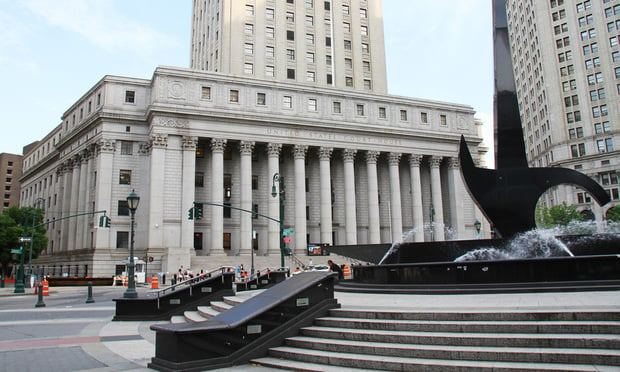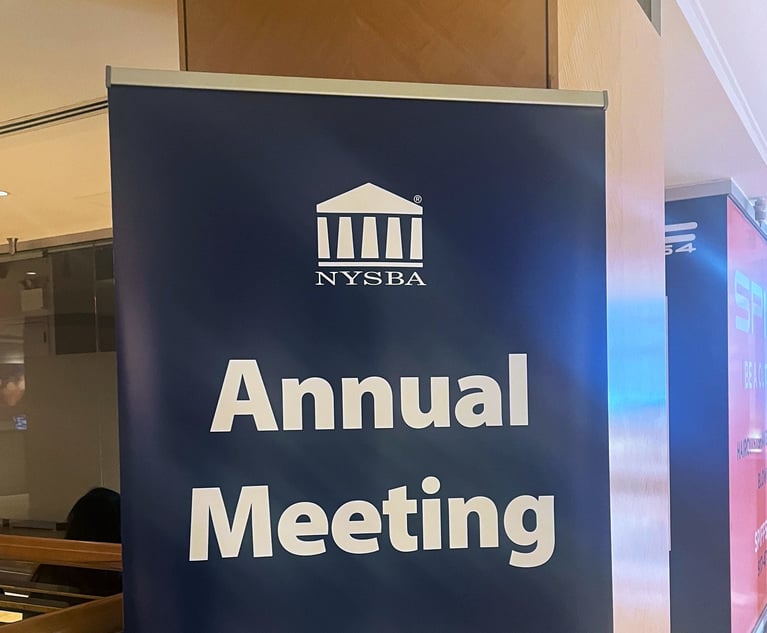Garaufis Should Have Granted Mobster's Request to Unseal Documents, 2nd Circuit Says
Convicted Bonanno crime family member Anthony Donato sought to have documents from the trial of his former boss, “Vinny Gorgeous” Basciano, to help with his post-conviction legal efforts.
March 13, 2018 at 04:34 PM
3 minute read
 U.S. Court of Appeals for the Second Circuit.
U.S. Court of Appeals for the Second Circuit. A convicted mobster should have been provided some level of access to material under seal as part of his ongoing post-conviction relief efforts, a panel of the U.S. Court of Appeals for the Second Circuit found Tuesday.
The panel of Circuit Judges José Cabranes and Reena Raggi, with District Judge Lawrence Vilardo of the Western District of New York sitting by designation, issued a summary order reversing the denial of Anthony Donato's motion to unseal documents previously released to co-defendant Vincent “Vinny Gorgeous” Basciano, a Bonanno crime family boss. Basciano was convicted in two separate racketeering and murder trials in the Eastern District of New York, for which he's serving life in prison.
Donato pleaded guilty in 2008 to being part of a murder conspiracy in 2001 in which Donato, Basciano and another co-defendant gunned down Frank Santoro from Donato's car as Santoro walked his dog near his Bronx home.
Donato, who did not appeal his conviction, filed a habeas challenge in 2009, but his petition was denied by U.S. District Judge Nicholas Garaufis, who oversaw his original conviction. Part of Donato's argument was that the government withheld an exculpatory letter written by a cooperating witness during his trial.
That letter, according to court documents, supposedly would have supported Donato's defense that another cooperating witness, former Bonanno captain Dominick Cicale, fabricated Donato's involvement in the murder.
At issue before the appellate panel was an attempt by Donato to have Garaufis unseal material related to what is described in court documents as a bogus jailhouse murder plot involving a Colombian drug-dealing hit man and Cicale. That plan, concocted by Cicale, reportedly was to have the Colombian falsely claim Basciano had sought a Bureau of Prison's officer's help to get the hit man to kill Cicale.
The details of the plot were presented during Basciano's 2011 trial as a way to undermine Cicale's testimony against his former boss. Yet the details of the plot, though shared with Basciano's legal team and widely reported in the press, remained under seal, despite Donato's attempts otherwise.
On Tuesday, the appellate panel said Garaufis had correctly determined that the documents at issue were judicial documents rather than discovery material, which would have meant a greater burden for Donato.
However, the panel said the district court abused its discretion in keeping them under seal. While it acknowledged there were “higher values” issues, like the law enforcement and cooperating witness issues cited by Garaufis that could overcome the presumptive First Amendment right-to-access concerns, those concerns in the current case were applied “too broad for wholesale sealing,” the panel found.
The panel's own review found they were “largely cumulative of the information discussed” in Garaufis' order and “would require minimal redaction if unsealed,” despite the district court's claims otherwise. Information about witnesses in the witness protection program should understandably not be disclosed, the panel noted.
Donato is proceeding pro se in the matter.
This content has been archived. It is available through our partners, LexisNexis® and Bloomberg Law.
To view this content, please continue to their sites.
Not a Lexis Subscriber?
Subscribe Now
Not a Bloomberg Law Subscriber?
Subscribe Now
NOT FOR REPRINT
© 2025 ALM Global, LLC, All Rights Reserved. Request academic re-use from www.copyright.com. All other uses, submit a request to [email protected]. For more information visit Asset & Logo Licensing.
You Might Like
View All
Blake Lively’s Case Highlights How Pre-Litigation Subpoenas Can Expose Harassment in Hollywood
5 minute read


NYSBA Annual Meeting: How In-House Counsel Navigate Gen AI Risk
Trending Stories
- 1'Headaches,' Opportunities Ahead for Lawyers Advising Foreign Businesses, Attorneys Say
- 2'There's Always More to Be Done': Former US Attorney Breon Peace Reflects on Series of Firsts at EDNY
- 3Former Thomas Clerk Sarah Harris to Serve as Acting Solicitor General
- 4Coral Gables Firm Secures $26M Settlement
- 5Trump's Second Term Spurs Unusual Alliances Between US and European Law Firms
Who Got The Work
J. Brugh Lower of Gibbons has entered an appearance for industrial equipment supplier Devco Corporation in a pending trademark infringement lawsuit. The suit, accusing the defendant of selling knock-off Graco products, was filed Dec. 18 in New Jersey District Court by Rivkin Radler on behalf of Graco Inc. and Graco Minnesota. The case, assigned to U.S. District Judge Zahid N. Quraishi, is 3:24-cv-11294, Graco Inc. et al v. Devco Corporation.
Who Got The Work
Rebecca Maller-Stein and Kent A. Yalowitz of Arnold & Porter Kaye Scholer have entered their appearances for Hanaco Venture Capital and its executives, Lior Prosor and David Frankel, in a pending securities lawsuit. The action, filed on Dec. 24 in New York Southern District Court by Zell, Aron & Co. on behalf of Goldeneye Advisors, accuses the defendants of negligently and fraudulently managing the plaintiff's $1 million investment. The case, assigned to U.S. District Judge Vernon S. Broderick, is 1:24-cv-09918, Goldeneye Advisors, LLC v. Hanaco Venture Capital, Ltd. et al.
Who Got The Work
Attorneys from A&O Shearman has stepped in as defense counsel for Toronto-Dominion Bank and other defendants in a pending securities class action. The suit, filed Dec. 11 in New York Southern District Court by Bleichmar Fonti & Auld, accuses the defendants of concealing the bank's 'pervasive' deficiencies in regards to its compliance with the Bank Secrecy Act and the quality of its anti-money laundering controls. The case, assigned to U.S. District Judge Arun Subramanian, is 1:24-cv-09445, Gonzalez v. The Toronto-Dominion Bank et al.
Who Got The Work
Crown Castle International, a Pennsylvania company providing shared communications infrastructure, has turned to Luke D. Wolf of Gordon Rees Scully Mansukhani to fend off a pending breach-of-contract lawsuit. The court action, filed Nov. 25 in Michigan Eastern District Court by Hooper Hathaway PC on behalf of The Town Residences LLC, accuses Crown Castle of failing to transfer approximately $30,000 in utility payments from T-Mobile in breach of a roof-top lease and assignment agreement. The case, assigned to U.S. District Judge Susan K. Declercq, is 2:24-cv-13131, The Town Residences LLC v. T-Mobile US, Inc. et al.
Who Got The Work
Wilfred P. Coronato and Daniel M. Schwartz of McCarter & English have stepped in as defense counsel to Electrolux Home Products Inc. in a pending product liability lawsuit. The court action, filed Nov. 26 in New York Eastern District Court by Poulos Lopiccolo PC and Nagel Rice LLP on behalf of David Stern, alleges that the defendant's refrigerators’ drawers and shelving repeatedly break and fall apart within months after purchase. The case, assigned to U.S. District Judge Joan M. Azrack, is 2:24-cv-08204, Stern v. Electrolux Home Products, Inc.
Featured Firms
Law Offices of Gary Martin Hays & Associates, P.C.
(470) 294-1674
Law Offices of Mark E. Salomone
(857) 444-6468
Smith & Hassler
(713) 739-1250






